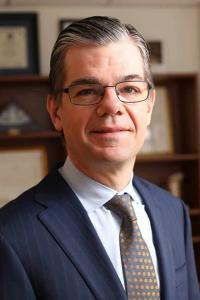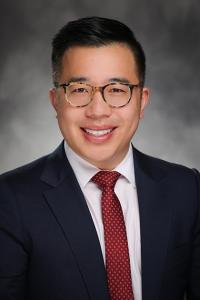Columbia Neurosurgery's Spine Team Presents at the 9th Annual International Spinal Deformity Symposium (ISDS)
Sharing Our Real-world Findings and Best Practices
Last week, our leading experts at Columbia Neurosurgery's Spine Division, Dr. Dean Chou, Dr. Peter Angevine and Dr. Andrew Chan, served as invited speakers at the 9th Annual International Spinal Deformity Symposium (ISDS) in NYC. The ISDS Conference is one of the world's leading forums to review research, analyze imaging and decision-making, provide step-by-step treatment options, and review post-op outcomes. The audience of orthopedic and neurological surgeons, fellows, and residents included some of the most prolific names in spinal deformity where attendees were provided a first-hand look at how each surgeon will bring a custom approach to a challenging case and a deep dive into the techniques used to achieve the desired outcome.
The program's opening session, "Degenerative Deformity in the Lumbar Region," included Dr. Andrew Chan's presentation, "I Can Do an MIS Decompression from L4-S1 to Treat the Fractional Curve," where Dr. Chan showcased some of his minimally invasive spine techniques used to treat degenerative deformities such as adult scoliosis. Dr. Chan stated, "Thoracolumbar or a targeted fractional curve fusion are important surgical options for patients with scoliosis. However, if you listen to the patient and identify a focal pain generator appropriate for MIS decompression, such as central stenosis with neurogenic claudication or lateral recess stenosis with leg pain, an MIS decompression alone may be all that is needed. I prefer an MIS tubular, microscopic approach that spares the osseoligamentous midline structures. This helps scoliosis patients retain as much biomechanical stability as possible in order to avoid reoperation and curve progression."
The following session, "Deformity Surgery: Rethinking Fusion Levels Above and Below," included Dr. Dean Chou and Dr. Peter Angevine. Dr. Chou's presentation, "MIS ASF/PSF Can Save Levels on Top and Bottom," used several case examples to illustrate his minimally invasive techniques for anterior and posterior spinal fusions. Following, Dr. Angevine presented "Post-op Considerations, Complications, Return to Normal Function, and Outcomes," also using a variety of recent cases to illustrate the spectrum of patient outcomes from various spine surgeries.
The rest of the meeting's sessions included a review of other spinal deformities and treatment options and some fascinating non-CME industry presentations related to advanced analytics and AI's potential use in robotics to advance surgical care in spine patients. Columbia Neurosurgery's spine team was honored to be featured at ISDS to share their expertise and how illustrate they will employ various interdisciplinary professionals to find a custom and tailored approach for every patient we serve.





